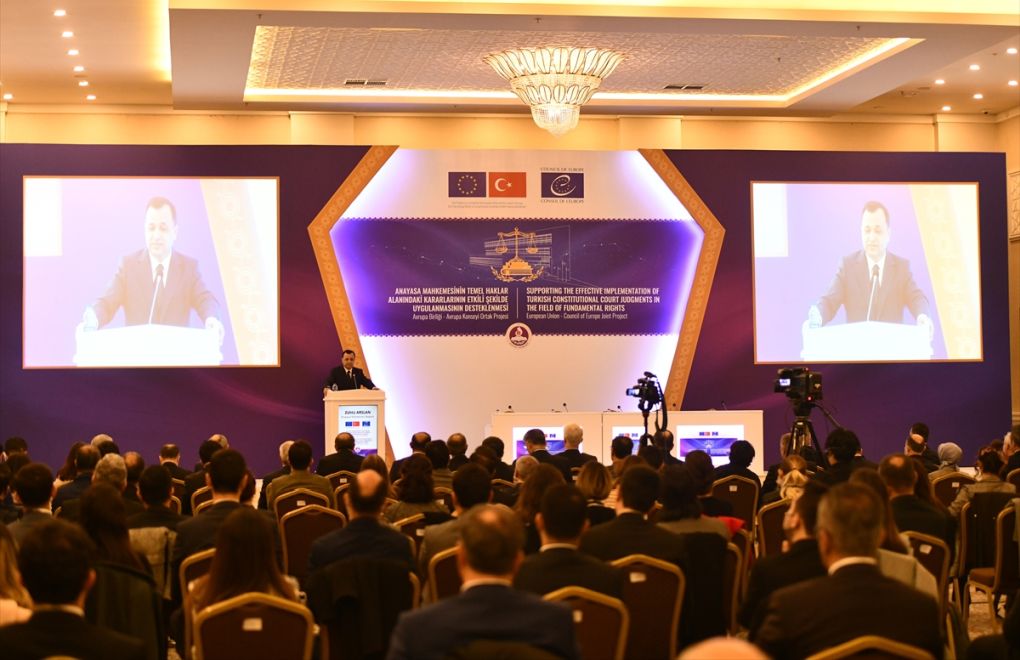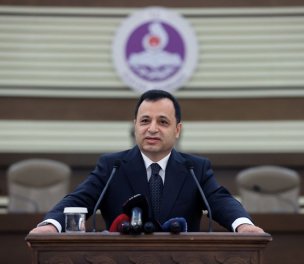* Photo: Adsız Günebakan - Antep / AA
Click to read the article in Turkish
Constitutional Court President Zühtü Arslan attended a meeting as part of the "Supporting the Effective Implementation of Turkish Constitutional Court Judgements in the Field of Fundamental Human Rights" project jointly run by the European Union (EU) and the Council of Europe.
While the regional meeting in Antep focused on the "Judgements of Rights Violation in Individual Applications and the Elimination of the Violation's Consequences in Fair Trial", Arslan made a speech at the meeting and shared the following figures about the individual applications:
"When I announced the number of pending individual applications, I said that the number was 66 thousand. It has not even been one and a half months since then. Today, the number of applications pending before the Constitutional Court has unfortunately hit 90 thousand".
Defining this number as "highly concerning", Arslan said, "Nowhere in the world is there a constitutional court or a human rights court addressed with such a high number of individual applications".
75 percent about the right to a fair trial
According to Constitutional Court President Arslan, there are three basic points that entail action by actors other than the top court:
"First of all, individual application is unfortunately still perceived as a means of appeal in our country. We know it from the applications to us.
Nearly 75 percent of the applications are about the right to a fair trial and nearly 90 percent of these applications are related to the issues that we call complaints about lengthy trials or complaints about legal remedies.
"We apparently have a structural problem with lengthy trials. We have to solve this. A considerably high rate of complaints submitted to us are concerning the lengthy trials. On the other hand, the complaints about legal remedies are, in fact, in the nature of appeals".
'Constitutional Court is not an appeal body'
Further in his statement, Arslan reiterated that after the right to make an individual application was granted to citizens, "the Constitutional Court has not turned into a body where appeals are lodged against the rulings of appeals courts or it is not a super appeal body to make an application to after the Court of Cassation and Council of State judgements".
Constitutional Court President Arslan noted that "in individual applications, the Constitutional Court is just a court which examines the complaints about violations of rights that occured in the process, just as the European Court of Human Rights (ECTHR) does".
"Therefore, especially lawyers should not bring the applications in the nature of appeals before the Constitutional Court. Otherwise, it will be impossible for us to deal with this workload," he added further.
Emphasis on 'state's positive obligation'
Moving on to the second point in this context, Zühtü Arslan noted that is to tap out the source of violations of rights:
"The Constitutional Court has been frequently emphasizing that the state has negative and positive obligations to protect fundamental rights.
"Negative obligations refer to a duty not to act. There are things that the state should not do. For instance, excessive force is used... Such as causing a violation of rights by using disproportionate force... It means that the negative obligations of the state are violated.
"On the other hand, there are also positive obligations of the ones who use public power. So, for instance, when an incident of death or injury occurs, it has to carry out a very swift, effective investigation.
"If it does not do what it is obliged to do, the positive obligation is violated and this comes to us as an application and ultimately as a violation in the end. The Constitutional Court has to deal with these.
"If the public power fulfills their negative and positive obligations, it will decrease the number of applications and this decrease will significantly decrease the number of ensuing violations in the end".
'Rulings of violation must be strictly implemented'
Lastly, Arslan underlined that the objective effect of the individual application must be put into practice, saying, "The rulings where the Constitutional Court finds a violation must be strictly implemented".
"The subjective effect, as we know, means meeting and eliminating the damages incurred by the applicant in a given application. This is the natural result of the application, it is what needs to happen. There is no need to even talk about it, to discuss it," said Arslan, adding:
"In all parts of the world, the rulings given by courts are binding and they should definitely be implemented in the concrete case.
But the issue that we need to talk about is the objective effect, which means the issue of the principles and provisions emphasized by the Constitutional Court in its rulings being heeded and implemented by the administrative bodies, by the judicial bodies, by the legislative body in such a way to prevent new violations from taking place.
"I believe that if we put the objective effect of the individual application into practice, the number of applications pending before the Constitutional Court will significantly drop". (AS/SD)






